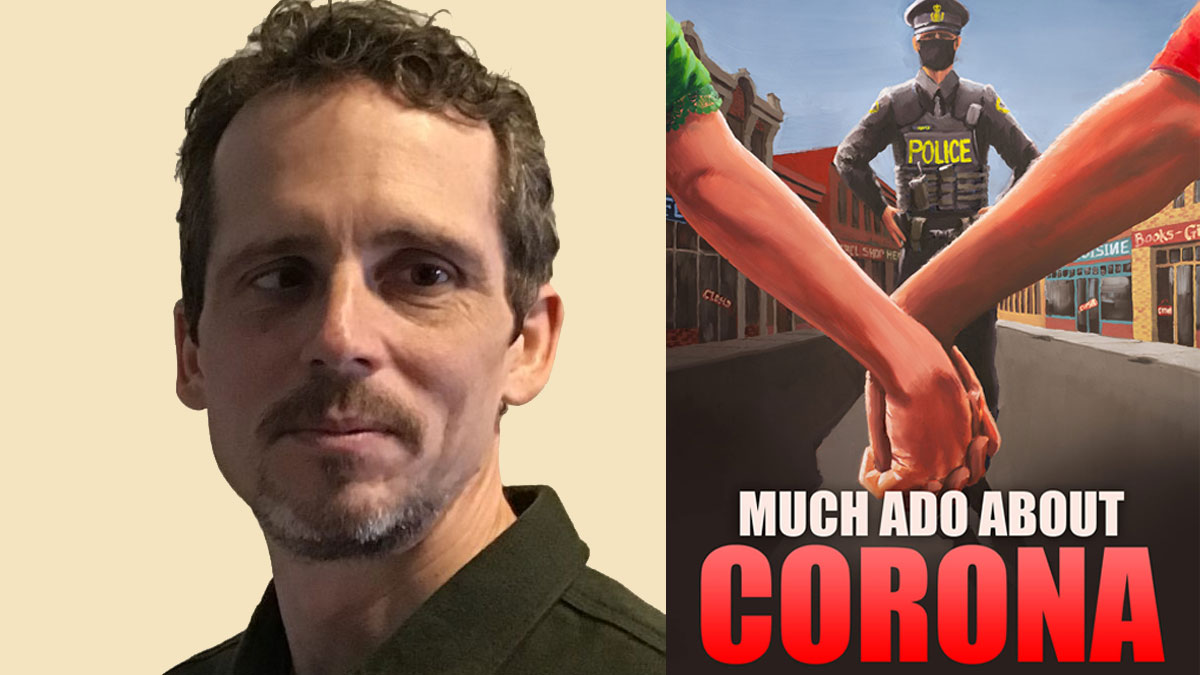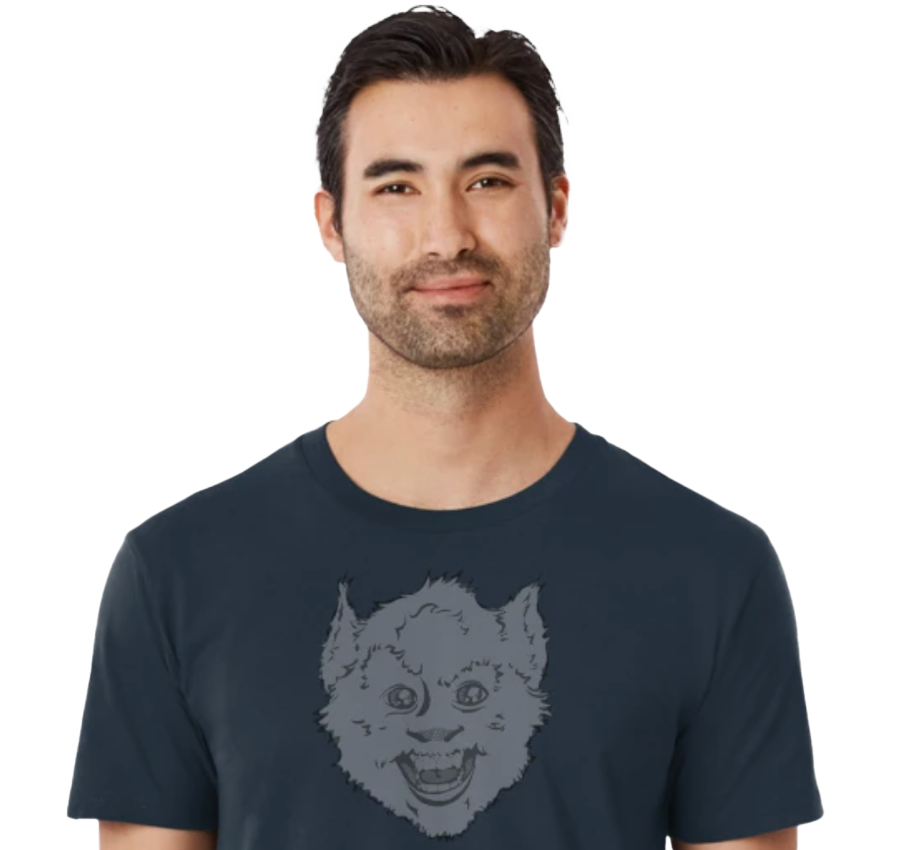While most of the world spent three years trying to flatten a two week curve, got spooked out on TV news infographics, took medical advice from Twitter doctors, stood six feet apart, posted vaccine selfies, obeyed tyrannical dictators and their newspapers, and even celebrated birthdays over Zoom (that was a thing?—ed), novelist John C.A. Manley instead crafted a poignant fictional novel based on the real science fiction of the world around him in Much Ado About Corona – A Dystopian Love Story.
In this GWU! unredacted exclusive, John discusses everything from the inspiration behind the novel to his National Book Award snub and what’s next for the fictional town of Moosehead where the novel is set. A Vaxx Pass is NOT REQUIRED to continue reading this SAFE AND EFFECTIVE interview. For you and your grandma’s protection, GWU! mandates that you order a copy of Much Ado About Corona – A Dystopian Love Story in order to STAY SAFE.
Although your novel, Much Ado About Corona – A Dystopian Love Story, is fiction; to us, it is a perfectly captured moment of the COVID pandemic. You wrote the novel in installments— published over email—was it difficult to craft the fictional story while the truth of it was ongoing?
Actually, that’s misinformation. Or disinformation. Are you controlled opposition? I simply could never have produced a novel of the quality of Much Ado About Corona via installments. I literally rewrote and edited all 500-pages from beginning to end over fifteen times. Ideas that didn’t emerge until I was writing chapter 102 needed to be set up in chapter 4, 28 and 42. There is so much subtle foreshadowing in this story that anyone who reads it twice will be rewarded.
Producing a novel in installments almost seems like a mystical power to me. Charles Dickens did it, but he was a genius. He also rambled a lot. I’ve read (this may be misinformation, too, mind you) that because he was forced to publish his stories chapter-by-chapter in magazine serials, he didn’t know what he’d need until later in the story, so he purposely included superfluous plot elements and characters.
But to answer the second part of your question: No, sadly, it wasn’t difficult to write the story in the midst of the so-called pandemic. Mainstream news, alternative news and day-to-day life in my small city all provided endless fodder for this story. Many of the lines said by characters came right out of the muzzled mouths of my mask-wearing neighbours who had suddenly become spokespersons for medical totalitarianism.
There’s an old saying that nothing bad ever happens to a writer. Everything is material that he can use somewhere in a story.
Why do you feel this was an important story to tell?
Almost overnight, we saw governments, media and so-called medical professionals execute the biggest hoax in human history. (Unless the flat earthers are right, then it’s the second biggest hoax.) Authorities managed to convince people to hide in their homes, shun their loved ones, stand six feet away from their neighbours, wear dirty masks, get dangerous and ineffective injections… all for what? There was no pandemic. It was a regular cold and flu season. The excess deaths in the US were caused by giving patients toxic anti-viral medication and rushing them onto ventilators. The fact this was happening in almost every developed country — small towns, big cities and even rural farmlands — at the exact same time showed how much power the psychopathic elite have over the population.
That’s the dark side of the story. The bright side was how it forced everyday people — like the characters in my novel — to stand up for basic human dignity and refuse to go along with this absurd form of oppression. Citizens were thrown into a culture and information war. They had to grow a thick skin and put up with being shunned by their neighbours. They had to risk being arrested and fined. Some were even beaten and killed. We were suddenly made to appreciate and fight for our freedom and self-respect.
“Show don’t tell” works exceptionally well in the novel, particularly when talking about the insane mandate measures and extreme way some people were following them. How difficult was it for you to be able to show both sides without writing the pro-mandate characters as total farce?
It was tempting to make this a satire. It would have been easier. But making fun of the sheeple was only going to create the type of civil war I suspect the elite would love to watch while they sit back smoking fat cigars.
Listen, I’ve got nothing against sheeple. They are often nice people. I wouldn’t say they are good or evil. But they keep society going. If everybody in Canada questioned authority as much as I do, we’d never get anything done. But, at the same time, we need a few goats like me and you to keep the sheep away from the wolves.
So I did spend a lot of time talking to and reading the points of view of people who believed in the mandates. I think this is most reflected in the character of Constable Corona. He is the villain of the story. But he’s a villain that so many readers have said they felt compassion for. I’d rather the reader go away seeing their masked, vaxxed neighbours as victims rather than enemies. Best to save our fury for the evil puppet masters.

The section of the book that deals with the disgraceful neglect in long-term care homes was particularly disturbing—the filth and cell-like room, where Vincent’s grandfather lives. Did you actually witness these horror-like conditions or was it purely speculative?
I do consider myself a speculative fiction writer, but the conditions in the novel’s fictional Moosehead Long Term Care were certainly neither speculative nor fictional. Sadly, they were a toned-down version of what was actually happening in Ontario nursing homes in the first year of the scamdemic. My depiction was drawn from three sources:
1. The 15-page report written by the Canadian Armed Forces who were called into assist at understaffed nursing homes in Ontario.
2. An investigative article written by freelance journalist Rosemary Frei, released in May 2020 by Off-Guardian.
3. My own personal experience, as both my parents were living in a nursing home in my city which was eventually commandeered by the Canadian Armed Forces. Much of Grandad’s experience from the novel was based on my father’s. They both suffered from dementia, and diminished physically and mentally during the first lockdown when they were confined to their rooms. My father eventually died, the following year, after receiving his third booster shot. I tried to convince my parents to move out, but they decided to stay due to the severity of their pre-existing ailments.
We loved how you brought real-world examples to the novel like Elmhurst Hospital in Queens. Writing fiction you could have really gone out there, but seemed to choose to show real world examples. Was it difficult to restrain yourself or was everything Covid related stranger than fiction anyway?
Oddly enough, in the early drafts, written in the first months of the pandemic, it was much more a “speculative fiction” novel. By the time I finished, I saw many of my speculations become reality. At times, I feared I was somehow the cause of the tyrannical nightmare we were witnessing.
The hardest decision was how many real-world examples to incorporate into the novel. I feel I found a good balance between a fictional story with factual elements. The drive behind the story was to both expose the inhumanity of what was being done to us and kindle the courage to push back. I wanted to avoid a tale set in a different time and place like 1984 or Brave New World or Wool. Instead, I was aiming for reality-based fiction akin to Harper Lee’s masterpiece, To Kill a Mockingbird.
How much of Vincent do you think was autobiographical? Were you or someone you know, for example, the type of person who originally accepted the pandemic measures, but grew to question them over time?
Actually, Vincent and I have very little in common as far as our reaction to tyrannical governments pushing pseudoscience. Rather, the character I most identify with is Stefanie Müller (other than her sex… no, I’m not transgender).
Vince, rather, was my attempt at depicting the ideal reader for this novel: Someone who is sitting on the electric fence about the whole COVID debacle. They are the type who will go along to get along, trusting the experts, but, if you give them a good shaking, they awaken, slowly, to the truth.
This seems like a book that may not make Canada Reads, despite having GWU!’s vote. It breaks the narrative that CBC and other media pushed. Does it concern you that the establishment may never accept a book like this or is that actually a good thing?
In some ways it’s a good thing, because the establishment’s words and actions regarding COVID-19 have been nothing short of evil. For an evil establishment to accept this story, would mean the story, too, was corrupt. The story exposes the lies they spread and encourages people to not follow the masked herd. Therefore, I wasn’t surprised when it didn’t win the 2022 National Book Award.
Instead, I’d like to see the reverse: Where this book helps to either change or replace the current establishment.
The story even has scenes that poke fun at CBC and CTV News specifically. From a commercial standpoint, this has been difficult, because it’s near impossible to get any mainstream media exposure for the novel.
What is your hope for readers, particularly readers who may have accepted all the government mandates without question?
Subconsciously, I believe, stories shape people’s actions. The masses have been bombarded with stories about how it’s noble, compassionate and righteous to go along with masking, lockdowns and vaccinations. Much Ado About Corona provides an alternative story that shows how complying with the COVID measures is cowardly, harmful and downright evil. Instead, it’s a story about how a small group of people do the right thing when it is neither legal, popular or safe.
For readers who’ve accepted all the government mandates without questions, I would be happy if all they did was see the cover of the book or read the synopsis on the back — anything that might stir them from their hypnotic state. Just having the book out selling on major retailers, appearing in libraries and in people’s hands, is reshaping our culture — regardless of whether those most in need of reading it ever get past the tagline.
For those a little less brainwashed, yes, I hope they read the story and come closer to accepting the terrible truth about the globalists’ intentions. I think such people are already capable of seeing through the lies. Rather than convincing them with facts, the story focuses on converting them by example. It’s a story about a “fringe minority” of people in a small town who refuse to comply and, ultimately, get hunted down by the authorities. It provides role models. Even though they suffer for it, it’s still seen as the desirable and noble thing to do. It puts truth, honour and courage above safety, conformity and mediocrity.
To us this is a uniquely Canadian book, not only with references to The Tragically Hip (we love the scene in Moonbeam) but also with the use of Indigenous imagery, and hockey. We know that Canada had some of the harshest pandemic restrictions outside of China, do you think this book can be appreciated on a universal level as well?
Well, Australia may have been worse off than Canada. But, yes, I really think Canada was the best place to set this story. There was an expression going around during the Freedom Convoy that I think resonated with the world: “When Canadians get mad, you know it’s bad.”
I’ve also been happy to receive emails from many readers outside of Canada saying how much they enjoyed learning about our culture and history while reading the novel. I specifically set the story in the Sudbury region because this allowed me to represent the English, French and Indigenous peoples whom primarily make up our population. Along with the Chatterjee’s, a family of East Indian immigrants, I wanted to reflect how Canada has been a place where people respect each other despite their different heritages, races and beliefs. Such tolerance was clearly mutilated by the division the COVID regulations caused, where suddenly the “true north strong and free” adopted a two-tier society that would have made Stalin salivate.
Farley Mowat and Robert J. Sawyer have all proven that stories set in Canada are appreciated by readers all over the world. And, sadly, the COVID restrictions are something that people all over the world had first hand experience in. Hence, the story will feel too close to home regardless of whether a reader lives in Canada, the US, France, India or Australia.

What is your writing process: do you have a specific place and time to write or is it when you feel inspired?
If I only took a shower when I felt inspired, I’d be a pretty smelly guy. The same goes with writing. I write every day whether I feel like it or not. I even write on weekends. I mainly write in my “writing studio” (the corner of my bedroom), and out near the woods when weather is favourable.
Prior to this novel I was half-way through an urban fantasy story. When the lockdowns hit I switched over to penning a “short story” called COVID-27. I quickly saw a book, not a short story, emerging out of the pen. Initially I was writing for sixty-minutes a day. But after a few months of lockdown, I upped it to two hours a day. I kept it up at that pace for two years, accumulating over 1,100 hours of work.
At the time I was writing Much Ado About Corona I was taking care of my late wife (who was adamant I finish the novel before she passed away) and my blind son (who has a few novels of his own he is writing, too). I was also involved in other work to fight the COVID agenda, publishing non-fiction articles, and leading a local freedom group, as well as assisting with the People’s Party of Canada. So I generally wrote the novel in one-hour chunks between other duties.
Generally, each morning, I would go for a seven kilometre run, and come home and write for an hour, and then again in the afternoon out in the park. Often, I would take on the more difficult tasks of writing and rewriting in the morning, while the afternoon shift focused on research and editing. Though some days I might do three hours, then only one hour the next. I have a writing log which I post online for accountability purposes and to stay on track.
A sort of draft of your story was initially sent out as emails in short rough bursts. How did writing and publishing in this innovative way inform the final published story?
Okay, maybe you’re not spreading misinformation. Maybe you work for QAnon and are revealing what I did in an alternative timeline?
Honestly, I can’t imagine how anyone writes a novel in installments. For example, in the very first draft of the novel, half of the characters didn’t exist. There was no AJ, Raj, Bindu, Leo or Mathéo. There wasn’t even Grandad, if you can imagine. And Vince and Stefanie were a married couple. And Stefanie was of Irish descent, not German, and her name was Cindy. I decided in the end to employ the classic “boy meets girl” story, as it added another layer to the plot. It’s my understanding that love stories are the best selling form of fiction.
There is no doubt that the story isn’t over, without spoiling too much, is there anything you can share about Book 2?
Book Two, Brave New Normal, diverts from our current reality. For example, instead of the vaccine passports disappearing, they remain with much harsher restrictions and penalties. Anybody who is unjabbed must wear a red band around their arm, containing a white circle and the black silhouette of a coronavirus. People must stay six feet away from the unvaccinated. The unjabbed are not allowed to be employed. They cannot rent property. And, of course, they are not allowed into indoor public places. Special internment camps are set up in the northern territories for those who have neither their own land or income. It is similar to what the Canadian government did to citizens of Japanese origin during World War II.
Characters who had very minor or passing roles in the first book have surprised even me by having larger roles in the sequel. Claudia, the Latino nurse in the old age home, becomes a focal character at the beginning of the novel, redeeming herself so to speak. The red-headed nurse who had only a brief appearance in book one, ends up stealing a few scenes. There’s another character who returns, but I don’t want to ruin the surprise, as it was even a surprise to me when he appeared (yet at the same time, inevitable).
Just for fun, can you recommend one or two of your favorite books that GWU! readers might enjoy?
I don’t care for horror novels, but I think Stephen King’s novella, Rita Hayworth and Shawshank Redemption is an incredible story of how to endure and rise above tyranny. Yan Martel’s Life of Pi was a work of art, in my opinion, and deserves its place as one of the best selling novels of all-time. I’ve read To Kill a Mockingbird by Harper Lee several times — it was a big influence on Much Ado About Corona. And for a unique dystopian story of tyranny and deception, I highly recommend the Silos Series by Hugh Howey, beginning with the book Wool, which carries the great tagline: “If the lies don’t kill you, the truth will.” For a lighter view on tyranny, Amor Towles’s A Gentleman in Moscow is a delightful, but still a hard-hitting read. And, really, it’s hard to go wrong with Mark Twain’s Huckleberry Finn or Charles Dickens David Copperfield.
Please add some info about how people can get a copy of the book, website, contact info (if you want), will you be doing any readings, etc.
Much Ado About Corona: A Dystopian Love Story is available in ebook, paperback and hardcover format from all the major online retailers. You can also order it through your local bookstore. It’s even appearing in libraries in Canada and the US. Links to where you can buy it and instructions on how to request it at your local bookstore or library are available at MuchAdoAboutCorona.com. At that same site, you’ll also find reviews, trailers, a recording of the book launch and a multimedia sample of the prologue and first chapter.









When it came to stay at home orders we took it with a grain of salt and still went out and enjoyed the nice summer weather and in my case took photos, videos, walked the trails where quite a few other people walked. I put some clips on YouTube right in the middle of the pandemic under the Bowie70 screen name. In 2020 my wife and I also celebrated our 40th anniversary and her 65th birthday and my brother and her sisters garage along with many of both of our siblings. Regretfully we were not allowed to visit our mother for the last three months of her life except at the very end and then she was heavily sedated so I could only talk to her hoping she could hear me. Next day she passed away (June 4, 2020). As for masks most places accepted my face shield which was easier to breathe with. Only in healthcare they did not accept that method. And I only took two vaccine shots to stop the “experts” from whining and only when I didn’t have to stand in line for HOURS. In retrospect I could have foregone those since I was a senior and had no job to be fired from. Can’t say if the vaccine affected me and my wife since she had other health issues to contend with. Perhaps not being able to walk as far as a few years ago could have been from the vaccine but who knows. As for the vaccine it must be pretty lousy if it needs 4, 5, 6 boosters or whatever. That’s my story anyway.